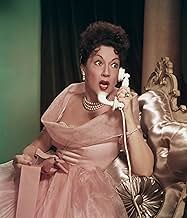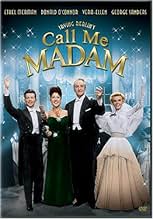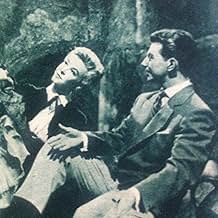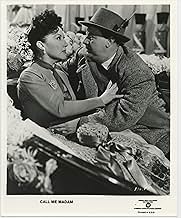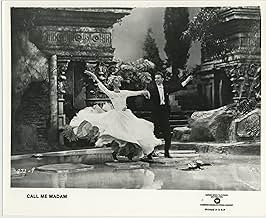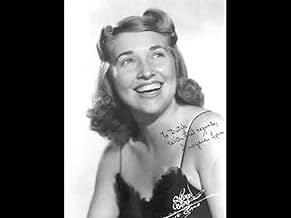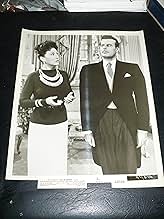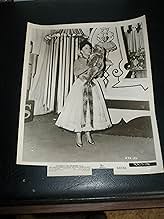NOTE IMDb
6,7/10
1,5 k
MA NOTE
Ajouter une intrigue dans votre langueWashington hostess Sally Adams becomes a Truman-era US ambassador to a European grand duchy.Washington hostess Sally Adams becomes a Truman-era US ambassador to a European grand duchy.Washington hostess Sally Adams becomes a Truman-era US ambassador to a European grand duchy.
- Réalisation
- Scénario
- Casting principal
- Récompensé par 1 Oscar
- 3 victoires et 4 nominations au total
Ludwig Stössel
- Grand Duke Otto
- (as Ludwig Stossel)
David Ahdar
- Dancer
- (non crédité)
Elizabeth Allan
- Singing Telephone Operator
- (non crédité)
Leon Alton
- Minor Role
- (non crédité)
Hanna Axmann-Rezzori
- Telephone Switchboard Operator
- (non crédité)
Leon Belasco
- Band Leader
- (non crédité)
Avis à la une
Movie audiences got a treat in Call Me Madam because they got to see Ethel Merman repeat one of two of her Broadway roles for the screen, the other being in the first Anything Goes.
For some reason, movie audiences never really took to Ethel. She did some parts during the Thirties, but in the Forties worked exclusively on Broadway. Mary Martin suffered a similar fate and we never got to see any of her Broadway starring roles with the exception of the famous telecast of Peter Pan.
Irving Berlin wrote the score for Call Me Madam and the book is based on the colorful life of Perle Mesta, famous Washington socialite who Harry Truman made ambassador to Luxembourg.
That's the way of things in Washington. Both parties with a new administration give ambassadorships out to wealthy contributors and Perle Mesta, an oil widow was one of the wealthiest.
Ethel is appointed by President Truman as Ambassador to the mythical duchy of Lichtenburg. Her rather informal style sets some professional State Department teeth rattling and during the course of the film both causes and solves a diplomatic crisis. Her personal assistant, Donald O'Connor is in her corner, but the chief of Protocol Billy DeWolfe is at his wit's end.
Both Ethel and Donald find romance in Lichtenburg, she with Count George Sanders and he with Vera-Ellen. When things aren't looking so good, they console each other with the hit song of Call Me Madam, You're Just In Love. This is what you call a contrapuntal melody with both members of the duet singing different melodies at the same time. At the same time this one was hitting the jukeboxes, another contrapuntal by Berlin, Play A Simple Melody was revived by Bing Crosby and his son Gary. To my knowledge no other major composer has ever had a hit with one of those.
George Sanders surprised quite a few folks with his singing voice. They needn't have been, he in fact had appeared in some musicals on the London stage before going into film. And he drops the sneer that usually accompanies most of us film characters and makes a most dashing and romantic count.
Dropped from the film version was Irving Berlin's tribute to Dwight D. Eisenhower which became his campaign theme song, I Like Ike. I guess it was considered redundant since the American people already had him. There are many references to Harry in the book and how Ethel was going to not let him down in the position he placed her in.
Billy DeWolfe steals every scene he's in as the fussy officious career foreign service employee, Pemberton Maxwell. If there ever was a name for a stuffy career WASP diplomat, that's it. They were a ripe target back then, certain politicians made a living on accusing a whole flock of them as traitors. One of them was Truman's Secretary of State, Dean Acheson. There manner didn't play well in what we would now call red state America.
Call Me Madam is bright and funny with a great score and some fabulous performances. Can't do better than that.
For some reason, movie audiences never really took to Ethel. She did some parts during the Thirties, but in the Forties worked exclusively on Broadway. Mary Martin suffered a similar fate and we never got to see any of her Broadway starring roles with the exception of the famous telecast of Peter Pan.
Irving Berlin wrote the score for Call Me Madam and the book is based on the colorful life of Perle Mesta, famous Washington socialite who Harry Truman made ambassador to Luxembourg.
That's the way of things in Washington. Both parties with a new administration give ambassadorships out to wealthy contributors and Perle Mesta, an oil widow was one of the wealthiest.
Ethel is appointed by President Truman as Ambassador to the mythical duchy of Lichtenburg. Her rather informal style sets some professional State Department teeth rattling and during the course of the film both causes and solves a diplomatic crisis. Her personal assistant, Donald O'Connor is in her corner, but the chief of Protocol Billy DeWolfe is at his wit's end.
Both Ethel and Donald find romance in Lichtenburg, she with Count George Sanders and he with Vera-Ellen. When things aren't looking so good, they console each other with the hit song of Call Me Madam, You're Just In Love. This is what you call a contrapuntal melody with both members of the duet singing different melodies at the same time. At the same time this one was hitting the jukeboxes, another contrapuntal by Berlin, Play A Simple Melody was revived by Bing Crosby and his son Gary. To my knowledge no other major composer has ever had a hit with one of those.
George Sanders surprised quite a few folks with his singing voice. They needn't have been, he in fact had appeared in some musicals on the London stage before going into film. And he drops the sneer that usually accompanies most of us film characters and makes a most dashing and romantic count.
Dropped from the film version was Irving Berlin's tribute to Dwight D. Eisenhower which became his campaign theme song, I Like Ike. I guess it was considered redundant since the American people already had him. There are many references to Harry in the book and how Ethel was going to not let him down in the position he placed her in.
Billy DeWolfe steals every scene he's in as the fussy officious career foreign service employee, Pemberton Maxwell. If there ever was a name for a stuffy career WASP diplomat, that's it. They were a ripe target back then, certain politicians made a living on accusing a whole flock of them as traitors. One of them was Truman's Secretary of State, Dean Acheson. There manner didn't play well in what we would now call red state America.
Call Me Madam is bright and funny with a great score and some fabulous performances. Can't do better than that.
I remember seeing Call Me Madam as a teenager when it first came out as a movie in 1953. There was the great Ethel Merman on the screen. I had never heard of her before as to who she was, but I saw the movie so many times that it is still very vivid in my mind. Always yelling "Hello Harry" every time the phone rang, when Billy De Wolfe tried to tell her that one of his jobs was to tell her how to dress, and she looked at him in his outfit with striped pants and quipped, "You're going to tell me how to dress? Your coat and pants don't even match!" But, the surprise of the movie was George Sanders singing especially his song "Marrying for Love". Who would have known that he had such a rich baritone voice. This was probably Vera Ellen's best movie including "Three Little Words" with Fred Astaire. She and Donald O'Connor were perfect in their dance numbers together. Ethel Merman's rendition of "The International Rag" was brassy and sassy the way only Ethel Merman could deliver it with the end of the song singing, "Oh, oh! Wiggle your personality!" and someone in the audience said, "She sure can wiggle it; can't she?" It was if as soon as you sat down to watch this wonderful musical, it was time to leave the theater. I understand that the film is finally going to be released on Video. It's about time. I'll buy one copy to look at and another to keep just in case. Wonderful entertainment. One of the best!
Call Me Madam is an excellent film, that I don't think is as appreciated as much as it should be. One of the film's main merits is that it is beautifully designed, with stunning cinematography, and Ethel Merman's dresses especially were to die for. The only things that let it down that let it down were its length and that one or two scenes could have simplified. However, these are fully compensated by the marvellous Irving Berlin songs and the dazzling choreography, evident in Donald O'Connor and Vera Ellen's dance routines. Now for the performances-Ethel Merman lends her big brassy personality to the character of Mrs Adams and does a highly commendable job. Whether she gave the best performance of the film is up for debate, personally I think not, for Donald O'Connor is a sheer delight as her assistant, and Vera Ellen looked beautiful and danced a dream. Though special mention should go to George Sanders as Cosmo Costantine, who not only shone with his charm and charisma, but also his singing was absolutely beautiful. Overall, a very well done musical, where the performances, songs and choreography shine through considerably, and fully compensate for the film's minor flaws. 8/10 Bethany Cox
Ethel Merman was unique in the annals of the American Musical Theater -she was responsible for the success of more shows, and introduced more songs that became Broadway standards (and by the best composers) than any other performer - even Mary Martin and Gwen Verdon never quite de-throned the First Lady of Musical Theater. But Merman is one of those whose talent didn't quite transcend the big screen, despite several attempts. Anyone seeing her on the screen today may well wonder what all the fuss was about, but take it from an eyewitness: Merman was a force of nature who had to be seen live to be appreciated - when she set foot on a stage, she OWNED that stage, the scenery, and every seat, patron, and brick of that theater.
Although it came along too late to make her a real movie star (she was in her mid-40s already and, unfortunately, wasn't aging gracefully), CALL ME MADAM is her best movie, and gives us the closest approximation of how the Merman magic lit up the stage (and the box-office). MADAM was very much a star vehicle, the kind they don't have today (let's face it: because they don't have such stars), and there wouldn't have been any point in filming it with anyone else - every situation, line, lyric and note of music was tailored to her style, personality, and, of course, voice (aside from the fact that the show is very dated politically, that's the other reason it was seldom revived without her. GYPSY, though a much better show, was considered a sacred Merman vehicle until Angela Lansbury tackled it in 1973 - it's been revived regularly ever since). Merman was known for 'freezing' a performance, seldom varying it by a syllable throughout a show's long run, and often claimed to be thinking about her grocery list while she was belting out a song. Though she probably 'tweaked' her performance for the screen, what we see here is very likely the way she played Sally Adams hundreds of times before and after the movie.
Although she certainly dominates the proceedings, Merman surprisingly doesn't hog the show (she even gave one of her songs over to Donald O'Connor, "Something To Dance About") - everyone gets their chance to shine, from George Sanders (not playing a cad for once, and displaying an excellent singing voice) to the wonderful Donald O'Connor and Vera-Ellen. O'Connor was riding the crest of his success in SINGIN' IN THE RAIN, and he's almost as good here - his performance is a joy, whether dancing with Vera-Ellen, by himself, or teaming up with Merman for the legendary duet of "You're Just In Love" that stopped the show cold on-stage (he was fond of saying that one of the Merm's high notes bent his eardrum!).
So pop this one in, sit back and have a wonderful time watching several seasoned troupers doing what they did best - entertaining!
Although it came along too late to make her a real movie star (she was in her mid-40s already and, unfortunately, wasn't aging gracefully), CALL ME MADAM is her best movie, and gives us the closest approximation of how the Merman magic lit up the stage (and the box-office). MADAM was very much a star vehicle, the kind they don't have today (let's face it: because they don't have such stars), and there wouldn't have been any point in filming it with anyone else - every situation, line, lyric and note of music was tailored to her style, personality, and, of course, voice (aside from the fact that the show is very dated politically, that's the other reason it was seldom revived without her. GYPSY, though a much better show, was considered a sacred Merman vehicle until Angela Lansbury tackled it in 1973 - it's been revived regularly ever since). Merman was known for 'freezing' a performance, seldom varying it by a syllable throughout a show's long run, and often claimed to be thinking about her grocery list while she was belting out a song. Though she probably 'tweaked' her performance for the screen, what we see here is very likely the way she played Sally Adams hundreds of times before and after the movie.
Although she certainly dominates the proceedings, Merman surprisingly doesn't hog the show (she even gave one of her songs over to Donald O'Connor, "Something To Dance About") - everyone gets their chance to shine, from George Sanders (not playing a cad for once, and displaying an excellent singing voice) to the wonderful Donald O'Connor and Vera-Ellen. O'Connor was riding the crest of his success in SINGIN' IN THE RAIN, and he's almost as good here - his performance is a joy, whether dancing with Vera-Ellen, by himself, or teaming up with Merman for the legendary duet of "You're Just In Love" that stopped the show cold on-stage (he was fond of saying that one of the Merm's high notes bent his eardrum!).
So pop this one in, sit back and have a wonderful time watching several seasoned troupers doing what they did best - entertaining!
10nmayers
Both Ethel Merman and Donald O'Connor suffered from the same misfortune -- lack of quality movie roles to showcase their extraordinary gifts. In O'Connor's case, it was because from childhood up into his middle twenties he was contracted by Universal Studios which, up 'til that time, produced "B" movies, suitable for coming into an air-cooled movie theater on a hot summer's day, but not much else. He always shone brightly, however, even in those early films, but not 'til Singin' In The Rain -- and Call Me Madam -- did he get the chance to glitter in great "A" material. Ethel Merman, the greatest of the Broadway greats had expansive mannerisms, stereophonic lungs, and irrepressable exhuberance, and was not considered cinema material by the powers that be. See how wrong the powers can be? O'Connor and Merman together in this film make it great -- his dancing, her voice, their personalities blending in just the right way. Great movie with two great leads -- don't miss "Call Me Madam"!
Le saviez-vous
- AnecdotesThis is the only full film musical that George Sanders made, despite his appealing singing voice.
- Citations
Cosmo Constantine: You are the most American American I have ever met.
Sally Adams: That's the nicest thing anyone's ever told me.
- Crédits fousDuring the opening credits, as each word in the title appears onscreen, we hear, but do not see, Ethel Merman exclaiming, in a demanding tone of voice: "Call..me..madam!"
- ConnexionsFeatured in Fred Astaire Salutes the Fox Musicals (1974)
- Bandes originalesOverture
Music and Lyrics by Irving Berlin
Performed by Ethel Merman and the 20th Century-Fox Studio Orchestra and Chorus
Meilleurs choix
Connectez-vous pour évaluer et suivre la liste de favoris afin de recevoir des recommandations personnalisées
- How long is Call Me Madam?Alimenté par Alexa
Détails
- Durée
- 1h 54min(114 min)
- Rapport de forme
- 1.37 : 1
Contribuer à cette page
Suggérer une modification ou ajouter du contenu manquant


